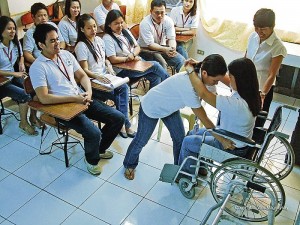Caregiving offers better chance for foreign employment

A caregiving trainee practices how to assist a wheelchair-bound person, as her classmates look on. Persons with disability are among the major employers of Filipino caregivers abroad.
Returning to the Philippines after three years, I noticed that the number of learning institutions offering the caregiving course had increased significantly. Even bigger universities, because of the high demand, were now offering the course.
Many Filipinos regard caregiving as the best chance for overseas employment and for improving their financial situation. Decades ago, Filipino women took the “DH” (domestic helper) route to foreign jobs.
Compared to work as a domestic helper, however, caregiving requires more specialized skills. It is professional work.
My friend Nic Arriola is a photojournalist who is also a caregiver in Los Angeles to supplement his income so he can send more to his family in the Philippines.
At the time of this writing, Nic was suffering from a fractured patella. Despite the excruciating pain in his kneecap, he continued working—pushing the wheelchair of a 200-pound patient, and transferring him to a chair or bed.
He said the job was not a means to make easy money. “It requires solid commitment.”
Flying back to Manila recently, I sat beside a guy from Batangas working in Jerusalem as a caregiver. He said he had to pay a very high placement fee to get the job in Israel.
Len Aquino, 35, has three children with a civil engineer husband now working in Trinidad and Tobago. She had just completed a caregiving job with a Korean senior citizen when I met her. She said she had to work for 12 hours, seven days a week.
Burned out
“A year of this non-stop work resulted in burnout. I was not able to devote enough time to my kids so I decided to quit,” Aquino said.
But she would want to find another foreign job to “give my children a brighter future in addition to the better income we’ll receive in Canada (where she is migrating). After two years of work there, I will be able to petition for my family (to join me).”
Aquino said 80 percent of caregivers wanted to go to Canada, the other 20 percent to the United Kingdom or the Middle East.
She did not mind taking the 760-hour course for which she paid over P20,000. Afterwards, she had to complete 120 hours of on-the-job training with children, and another 120 hours with the elderly.
Lucilinda Perillo, administrator of the seven-year-old Shalom Caregivers, Inc., where Aquino studied caregiving, explained the course, “Here, we teach them how to handle patients—transferring, feeding and bathing, doing bed shampooing and colostomy—as well as bed making and other tasks.”
Two of Shalom’s trainers, Alicia Rosario Aristan and Amy Jimenez, are very passionate about their work and believe KSA (knowledge, skills and attitude) are of paramount importance for success.
“Kayod kalabaw, kita’y kambing dito” [You work like a carabao but earn a goat’s wage in the Philippines]—this is the reason why many want to (study caregiving),” Rosario said.
Although caregivers were initially motivated by financial considerations, they often ended up liking their jobs, the trainers said.
Aquino said during her first two weeks on the job, she and her ward mutually disliked each other. Their relationship improved to the point that, when Aquino said she was resigning, her employer asked her to reconsider.
Jimenez, a registered nurse who has worked in the United States, said, “Of course it was the (anticipated) financial reward that brought them to this school. The students also knew that, even if they were not able to go abroad, they could (use) what they learned to help their own families.”
High placement fee
According to the trainers, the biggest obstacle to overseas employment was the high placement fee charged by employment agencies—P200,000-P350,000 ($4,000 to $7,000).
The caregiver I met in the plane complained that he paid P60,000 ($1,200) a few years ago but he only earned $250 a month in Israel.
For fresh graduates this meant they would spend the first two years or more just repaying the money they borrowed for the placement fee, before they could start to enjoy freely the benefits of their education.
The work itself required a lot of patience, determination, adjustments, and sacrifice. Everyone agreed that the job of a caregiver was not a stroll in the park.
Aside from the financial returns, and despite the difficulties, caregivers said they felt rewarded when they saw their wards showing significant improvement in their care.
Vics Magsaysay is a Long Beach, California-based fine art nature photographer, artist, writer and alternative healer.














